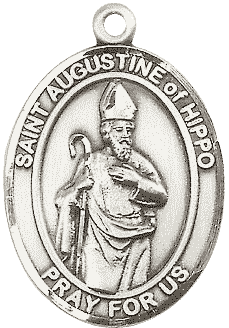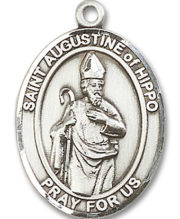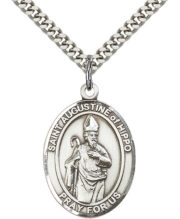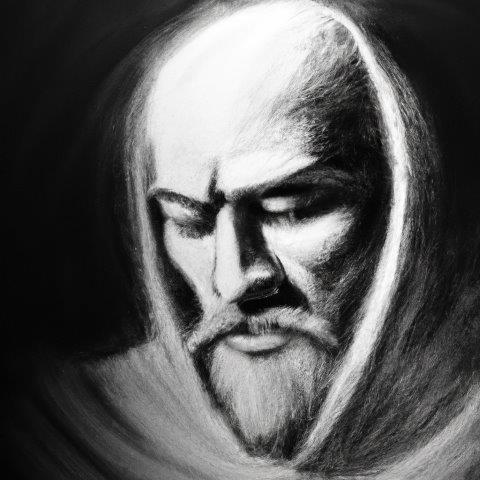Saints
St. Augustine of Hippo
St. Augustine of Hippo Biography
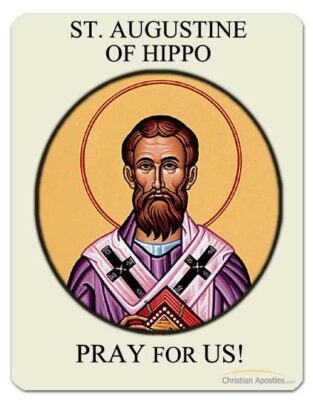 St. Augustine of Hippo, also known as Saint Augustine, Saint Austin, or Saint Augoustinos, was a Roman African, early Christian theologian and philosopher from Numidia whose writings influenced the development of Western Christianity and Western philosophy. He was the bishop of Hippo Regius in north Africa and is viewed as one of the most important Church Fathers in Western Christianity for his writings in the Patristic Period.
St. Augustine of Hippo, also known as Saint Augustine, Saint Austin, or Saint Augoustinos, was a Roman African, early Christian theologian and philosopher from Numidia whose writings influenced the development of Western Christianity and Western philosophy. He was the bishop of Hippo Regius in north Africa and is viewed as one of the most important Church Fathers in Western Christianity for his writings in the Patristic Period.
Augustine was born in the Roman province of Africa, in the city of Thagaste in modern-day Algeria, in 354 AD. His mother, Monica, was a devout Christian and his father, Patricius, was a pagan. Augustine was brought up as a Christian, but he was deeply influenced by the Manichaeism, a gnostic religion, before converting to Christianity. He was educated in Carthage, and later in Rome and Milan.
In 383 AD, Augustine returned to Africa and settled in Hippo, where he established himself as a rhetorician and teacher. He became a Christian priest in 391 AD and in 396 AD was appointed as the bishop of Hippo, a position he held until his death in 430 AD. As bishop, Augustine was a passionate and eloquent preacher, and he wrote extensively on a wide range of theological and philosophical issues.
One of Augustine’s most famous works is the “Confessions,” which is considered one of the greatest works of Western spiritual autobiography. The work is both a personal confession of faith and a history of Augustine’s spiritual development. He also wrote “City of God” where he defends Christianity against the charge that it was responsible for the fall of the Roman Empire, but also lays out his own theology of the Catholic Church, including on Original Sin, Grace and predestination.
Augustine’s writings also had a significant influence on Western philosophy. His ideas on the nature of time and on the relationship between the self and the divine have been particularly influential. He believed that God is outside of time, that the soul is immortal, and that the function of human life is to seek union with God through the practice of virtue and contemplation.
Augustine’s thoughts on politics and society were also highly influential. He believed that the ultimate goal of politics is to establish a just and peaceful society in which individuals are able to lead virtuous lives and come closer to God. He was a strong advocate of the idea of a “Just War” and his concept of the “Two Cities” idea, the City of God and the City of Man, had a lasting impact on Western political thought.
Augustine’s theology had a profound influence on the development of Western Christianity. He developed key concepts that are still central to Christian doctrine, such as Original Sin, the nature of God and the Trinity, and the role of grace in salvation. His work was influential on later thinkers such as Thomas Aquinas and Martin Luther.
Augustine died in Hippo on August 28, 430 AD during the siege of the city by the Vandals. He was canonized as a saint by the Catholic Church in 1298 and his feast day is celebrated on August 28th. He is considered one of the most important figures in the development of Western Christianity and his writings continue to be widely read and studied today.
The Life of St. Augustine of Hippo
Saint Augustine, also referred to as St. Austin, the most illustrious Doctor of the Church of Christ, was born on November 13, 354, at Tagaste, Africa. His father, Patricius, a pagan, was baptized a little before his death; his mother was St. Monica, whose feast is celebrated on May 4th. Augustine had been instructed in the rudiments of Christianity in his early youth but, like the prodigal son, of sixteen had the misfortune to lose his Faith.
When he was 20 returned home to his mother country and opened a school of grammar and rhetoric. His mother never ceased to pray for his conversion. In 375 Augustine went to Carthage, where he had spent four years pursuing his studies, and opened a school of rhetoric, where he taught for eight years. Disgusted at the disorderly behavior of the students, Augustine resolved to go to Rome. It was while there that he severed relationship with the Manicheans, with whom he had spent nine years. His search for truth finally led him to the One, True, Fold of Christ.
Tolle Lege
Two Latin words: Tolle Lege; Tolle Lege: “Take up and read; Take up and read”, caused him to peruse the Epistles of St. Paul. Opening the book his eyes fell upon the words, “Not in rioting and drunkenness; not in chambering and impurities; not in contention and envy; but put ye on the Lord Jesus Christ, and make not provision for the flesh in its concupiscence’s”. (Romans 13:13. 14.) He read no further; all the darkness of his previous life was dispelled.
When he was 32, after listening to sermons by St. Ambrose in Milan he was converted and was baptized. He intended to return to Africa with his mother, but she died unexpectedly while they were at Ostia. St. Augustine therefore spent a year in Rome and returned to Tagaste in 388. After distributing his goods to the poor he founded a monastery on one of his former estates, which was the beginning of the great Augustinian Order.
Early in 391, St. Augustine was ordained Priest by Valaerius, and after settling in Hippo was consecrated Bishop in 395. The following year he succeeded Bishop Valerius. On August 28, 430, while the Vandals were besieging his episcopal city, St. Augustine died. For thirty-five years he had been the center of ecclesiastical life in Africa, and the Church’s greatest champion against heresy. Among his ninety-six works are his “Confessions” and the twenty books of “The City of God”; refutations of Manichaeism, Donatism, Pelagianism and other heresies of his time, and those that deal with spirituality, philosophy, history, exegesis and morals. More than 400 of his sermons and 217 of his letters are extant today. St. Augustine was a philosopher and dogmatic theologian, as well as a mystic and a powerful controversialist.
Prayers to St. Augustine of Hippo
Prayer for the Intercession while wearing a St. Augustine of Hippo Medal
We humbly supplicate and beseech thee, O thrice-blessed Augustine, that thou wouldst be mindful of us poor sinners this day, daily, and at the hour of our death, that by thy merits and prayers we may be delivered from all evils, of soul as well as body, and daily increase in virtue and good works; obtain for us that we may know our God and know ourselves, that in His mercy He may cause us to love Him above all things in life and death; impart to us, we beseech thee, some share of that love with which thou so ardently glow, that our hearts being all inflamed with this divine love, happily departing out of this mortal pilgrimage, we may deserve to praise with thee the loving heart of Jesus for a never-ending eternity.
Prayer for Protection (written by St. Augustine of Hippo)
Lord, our God, we are in the shadow of your wings. Protect us and bear us up. You will care for us as if we were little children, even to our old age. When you are our strength, we are strong; but when we are our own strength, we are weak. Our good always lives in your presence, and we suffer when we turn our faces away from you. We now return to you, O Lord that we may never turn away again. Amen
Prayer to St. Augustine for Forgiveness
Dear St. Augustine of Hippo, you were a man of great wisdom and faith who devoted your life to seeking God’s grace and truth. Help me to follow in your footsteps, to confess my sins and receive God’s mercy and forgiveness. Teach me to love and trust in God, to turn away from my sins, and to live a life of virtue and holiness. Amen.
Prayer to St. Augustine for Guidance
O holy St. Augustine of Hippo, you have been a shining light of wisdom and guidance for generations. Help me to seek your intercession, as I seek direction in my life. Give me the courage to trust in God’s plan, and the wisdom to follow His will. Teach me to be a witness of God’s love, and to share the gospel with others. Amen.
Prayer to St. Augustine for Wisdom
Dear St. Augustine of Hippo, you were a man of deep wisdom and insight. Teach me to seek your intercession as I seek knowledge and understanding. Help me to discern God’s truth, and to live a life that is in accordance with His will. Give me the grace to grow in wisdom and understanding, so that I may serve God and His people. Amen.
Prayer St. Augustine for Conversion
O St. Augustine of Hippo, you have been an inspiration to many, as you turned away from your sinful ways and embraced the love of God. Help me to seek your intercession as I seek to turn away from sin and turn towards God. Give me the strength to resist temptation, and the courage to live a life that is pleasing to God. Amen.
Prayer St. Augustine for Peace
Dear St. Augustine of Hippo, you were a man of peace and compassion. Help me to seek your intercession as I seek peace and comfort in my life. Give me the grace to trust in God’s love, and to find comfort in His arms. Teach me to be a peacemaker, and to live a life of compassion and love. Amen.
Popular St. Augustine of Hippo Items
A St. Augustine of Hippo medal or a St. Augustine of Hippo rosary is a perfect gift to give to a young man who has chosen St. Augustine as their confirmation name. As the patron saint of theologians, wearing a St. Augustine of Hippo medal daily is a perpetual prayer for Saint Augustine of Hippo to intercede on behalf of the wearer. As saints are united closer to God, their prayers are more efficacious, and enriches your own prayer.
Additionally, a Saint Augustine of Hippo pendant is a reminder to emulate the example of the holy saint as you delve deeper into your faith. What a beautiful testament of faith to share with the world, or to keep discretely tucked under your clothes. During the challenging moments of your day, reflect upon the holy life of St. Augustine of Hippo and pray for their intercession and protection.
Medals and Pendants
Patron Saints - A's
Popular St. Austin Medal and St. Austin Rosary
Patron Saints - A's
By Type
St. Augustine of Hippo is the patron saint of brewers
St. Augustine of Hippo is a famous Christian saint who lived in the fourth century. He is considered one of the most influential figures in Western Christianity, and is remembered for his contributions to philosophy, theology, and spirituality. He is also recognized as the patron saint of brewers, printers, and theologians. In this blog post, we will explore the reasons why St. Augustine is considered the patron saint of these professions and the impact of his life on the Christian faith.
Brewers
St. Augustine is considered the patron saint of brewers because of his teachings on moderation. He believed that one should avoid excessive drinking, as it can lead to sinful behavior. Instead, he encouraged moderate drinking as a way to celebrate God’s creation and to share in community with others. St. Augustine’s teachings on moderation and his belief in the importance of moderation in all aspects of life have made him a popular patron saint for those who work in the brewing industry.
Printers
St. Augustine is also considered the patron saint of printers because of his contributions to Christian literature. He wrote extensively on a wide range of topics, including philosophy, theology, and spirituality. His works, such as “Confessions” and “City of God,” have been widely read and continue to be influential today. In recognition of his contributions to Christian literature and his legacy as a writer, St. Augustine has been named the patron saint of printers.
Theologians
Finally, St. Augustine is considered the patron saint of theologians because of his contributions to Christian theology. He was a prolific writer and a passionate advocate for the Christian faith. His teachings on the nature of God, the role of the Church, and the importance of grace have been widely accepted and continue to shape the Christian faith today. In recognition of his impact on Christian theology, St. Augustine has been named the patron saint of theologians.
In conclusion, St. Augustine of Hippo is a widely recognized and respected figure in Western Christianity. He is considered the patron saint of brewers, printers, and theologians because of his teachings on moderation, his contributions to Christian literature, and his impact on Christian theology. He continues to be an inspiration to people all over the world, and his legacy continues to shape the Christian faith today.
Reflection of the Feast of St. Augustine of Hippo
The feast of St. Augustine is celebrated on August 28th in honor of St. Augustine of Hippo. St. Augustine died on August 28th, 430, and he was canonized a saint by the Catholic Church. The feast of St. Augustine is celebrated on August 28th in honor of his life and legacy, and his writings continue to inspire and guide people all over the world.
St. Augustine of Hippo, was a theologian and philosopher who lived in the 4th and 5th centuries. He is one of the most influential figures in the history of Christianity, and his writings have had a lasting impact on the Church and on the broader culture.
St. Augustine was born in 354 in the Roman province of Africa. He was raised in a Christian household and received a thorough education. As a young man, St. Augustine strayed from the path of faith and pursued a life of pleasure and indulgence. He was deeply influenced by the teachings of the philosophers of his time, and he embraced a worldview that was at odds with the Christian faith.
Despite this, St. Augustine always felt a deep sense of unease and a longing for something more. He struggled with doubts and questions about the meaning of life, and he searched for answers in the teachings of the philosophers.
Eventually, St. Augustine experienced a profound conversion and turned back to the Christian faith. He was deeply moved by the words of St. Ambrose, a bishop and theologian, and he experienced a powerful encounter with God that changed the course of his life.
After his conversion, St. Augustine dedicated himself to the study of theology and philosophy, and he became one of the greatest minds of his time. He wrote extensively about the Christian faith and about the nature of God, and his writings have had a lasting impact on the Church and on the broader culture.
Lessons learned from the life of St. Augusitne of Hippo
The feast day of St. Augustine of Hippo is August 28th.
St. Augustine of Hippo, also known as Augustine of Hippo or simply Augustine, was a 4th-5th century Christian bishop and theologian. He is considered one of the most important figures in the history of Christianity and his writings have had a profound influence on the development of Western Christianity. He is known for his work “Confessions” which is considered a classic of Western literature and one of the first Western autobiographies ever written.
On his feast day, we remember the life and legacy of St. Augustine and the lessons we can learn from him. One of the most important things to take away from the life of St. Augustine is his emphasis on the importance of grace and humility. He believed that it is only through God’s grace that we can truly understand and live according to the teachings of Jesus Christ.
Another important lesson we can learn from St. Augustine is his deep understanding of human nature. He believed that all human beings have a natural inclination towards sin and that it is only through God’s grace that we can overcome our sinful nature.
We can also learn from St. Augustine’s dedication to the pursuit of knowledge and wisdom. He believed that true wisdom can only be found in God and that the pursuit of knowledge and wisdom is essential for understanding the truth of the faith.
As we celebrate the feast day of St. Augustine of Hippo, let us reflect on the lessons we can learn from him, and be inspired by his example to seek grace and humility, to understand our human nature and to be dedicated to the pursuit of knowledge and wisdom.
In these ways, we can follow in the footsteps of St. Augustine and become true seekers of God, who, as he once said, “The world is a book, and those who do not travel read only one page.”
One of the main lessons we can learn from St. Augustine of Hippo is the importance of self-awareness. Augustine’s Confessions, a spiritual autobiography, is a profound exploration of his own soul and his own struggles. He encourages us to take a hard look at ourselves, to examine our own thoughts, feelings, and actions and to be honest about our own limitations and weaknesses. This self-awareness is an essential step in our spiritual journey, as it allows us to gain a deeper understanding of ourselves and our relationship with God.
Another important lesson from St. Augustine of Hippo is the importance of grace. Augustine emphasized that salvation comes not from our own efforts, but from the grace of God. He teaches that grace is not something that we can earn, but something that God freely offers to us. This understanding of grace is an important reminder that we cannot save ourselves, and that our salvation comes from God’s love and mercy.
A third lesson from St. Augustine of Hippo is the power of forgiveness. Augustine’s own life was marked by many mistakes and sins, but he was able to find redemption and forgiveness through his faith in God. He teaches that forgiveness is not only possible but essential for our own spiritual well-being and that it is a fundamental aspect of our relationship with God. Today, we can learn from Augustine’s example and strive to forgive ourselves and others, as it is a powerful act of love and grace.
A fourth lesson from St. Augustine of Hippo is the importance of community. Augustine was not only a solitary figure but also a leader of the Christian community. He emphasized the importance of being part of a community of believers who can support and encourage each other in their spiritual journey. He also, stressed the importance of charity and love as a fundamental aspect of Christian community. Today, we can learn from Augustine’s example and strive to build strong and loving communities that support and encourage each other in their spiritual journey.
Finally, St. Augustine of Hippo reminds us of the importance of intellectual curiosity and the pursuit of knowledge in our spiritual journey. Augustine was a philosopher, theologian, and bishop and he always encouraged the pursuit of knowledge and understanding of the world and our faith. Today, we can take inspiration from his example and strive to deepen our understanding of our faith and the world around us.
Top 10 Quotes by St. Augustine
These quotes reflect the teachings and values of St. Augustine, and they offer insight into his beliefs about faith, love, truth, and the nature of God. St. Augustine was a man of great wisdom and insight, and his words continue to inspire and guide people all over the world.
- “Faith is to believe what you do not see; the reward of this faith is to see what you believe.”
- “Love is the beauty of the soul.”
- “The truth is like a lion; you don’t have to defend it. Let it loose; it will defend itself.”
- “God loves each of us as if there were only one of us.”
- “The world is a book, and those who do not travel read only a page.”
- “Hope has two beautiful daughters. Their names are anger and courage; anger at the way things are, and courage to see that they do not remain the way they are.”
- “Miracles are not contrary to nature, but only contrary to what we know about nature.”
- “The truth is a torch, but a crooked one.”
- “To fall in love with God is the greatest romance; to seek him the greatest adventure; to find him, the greatest human achievement.”
- “Believe those who are seeking the truth. Doubt those who find it.”
St. Augustine of Hippo’s top writings
St. Augustine was a prolific writer, and his works have had a lasting impact on the Church and on theology.
Some of the most well-known writings of St. Augustine of Canterbury include:
-
“The Confessions” – This is a spiritual autobiography written by St. Augustine that details his journey to faith and his struggles with sin and temptation. It is considered one of the greatest works of literature in the Western tradition and has been widely read and studied for centuries.
-
“On the Trinity” – This is a treatise written by St. Augustine that explores the nature of the Trinity and the relationship between the Father, the Son, and the Holy Spirit. It is considered one of the most important works on the doctrine of the Trinity and has had a significant influence on Christian theology.
-
“On Christian Doctrine” – This is a treatise written by St. Augustine that outlines his approach to interpreting the Bible and understanding the teachings of the Church. It is considered a classic work on hermeneutics and has had a lasting influence on the way the Bible is studied and understood.
-
“The City of God” – This is a treatise written by St. Augustine that discusses the nature of the Christian life and the role of the Church in society. It is considered a classic work on Christian political thought and has had a significant influence on the way the Church has engaged with the broader culture.
-
“Letters” – St. Augustine wrote many letters throughout his life, and these letters provide insight into his thoughts, beliefs, and experiences. Many of these letters are considered important works of literature and have been widely studied and analyzed.
Overall, the writings of St. Augustine of Canterbury are considered some of the most important works in the history of Christian theology, and they have had a lasting impact on the Church and on the broader culture.
Papal Homily Reflection on St. Augustine
 “You have made us for yourself, and our heart is restless until it rests in you” (Confessions, 1, 1, 1). With these famous words St Augustine addresses God in his Confessions, and these words sum up his whole life.
“You have made us for yourself, and our heart is restless until it rests in you” (Confessions, 1, 1, 1). With these famous words St Augustine addresses God in his Confessions, and these words sum up his whole life.
“Restlessness”: this word makes an impression on me and sets me thinking. I would like to start with a question: what fundamental restlessness did Augustine live in his life? Or perhaps I should say: what kinds of restlessness does this great and holy man ask us to awaken and to keep alive in our own existence? I am proposing three kinds: the restlessness of spiritual seeking, the restlessness of the encounter with God, the restlessness of love.
1. The first: the restlessness of spiritual seeking. Augustine lived an experience that is fairly common today: common enough among today’s young people. He was raised in the Christian faith by his mother Monica, even though he did not receive Baptism. However, as he grew up he fell away from the faith, failing to find the answer to his questions, to his heart’s desires, and was attracted by other proposals. He then joined a group of Manichaeans, devoted himself diligently to his studies, did not give up carefree pleasures, the spectacles of his time and deep friendships. He experienced intense love and had a brilliant career as a teacher of rhetoric that even took him to the imperial court in Milan. Augustine was a man who had “made it”, he had everything. Nevertheless, his heart still yearned for life’s deep meaning; his heart had not been overcome by sleep.
I would say it had not been anaesthetized by success, by things or by power. Augustine did not withdraw into himself, he did not settle down, he continued his quest for the truth, for the meaning of life. He continued to seek God’s face. Of course he made mistakes, he took wrong turns, he sinned, he was a sinner. Yet he retained the restlessness of spiritual seeking. In this way he discovered that God was waiting for him, indeed, that he had never ceased to be the first to seek him. I would like to tell those who feel indifferent to God, to faith, and those who are far from God or who have distanced themselves from him, that we too, with our “distancing” and our “abandonment” of God, that may seem insignificant but are so numerous in our daily life: look into the depths of your heart, look into your own inner depths and ask yourself: do you have a heart that desires something great, or a heart that has been lulled to sleep by things? Has your heart preserved the restlessness of seeking or have you let it be suffocated by things that end by hardening it?
God awaits you, he seeks you; how do you respond to him? Are you aware of the situation of your soul? Or have you nodded off? Do you believe God is waiting for you or does this truth consist only of “words”?
2. In Augustine it was this very restlessness in his heart which brought him to a personal encounter with Christ, brought him to understand that the remote God he was seeking was the God who is close to every human being, the God close to our heart, who was “more inward than my innermost self” (cf. ibid. III, 6, 11). However even in the discovery of and encounter with God, Augustine did not stop, he did not give up, he did not withdraw into himself like those who have already arrived, but continued his search.
The restlessness of seeking the truth, of seeking God, became the restlessness to know him ever better and of coming out of himself to make others know him. It was precisely the restlessness of love. He would have liked a peaceful life of study and prayer but God called him to be a Pastor in Hippo, in a difficult period, with a split community and war at the gates. And Augustine let God make him restless, he never tired of proclaiming him, of evangelizing with courage and without fear, he sought to be the image of Jesus the Good Shepherd who knows his sheep (cf. Jn 10:14).
Indeed, as I like to repeat, he “knew the odour of his sheep”, and went out to search for those that had strayed. Augustine lived as St Paul had instructed Timothy and each one of us: he proclaimed the word, he insisted in season and out of season, he proclaimed the Gospel with a magnanimous heart, with a great heart (cf. 2 Tim 4:2), that of a Pastor who is anxious about his sheep. Augustine’s treasure is this very attitude: always going towards God, always going out towards the flock…. He was a man constantly stretched between these poles; never “privatizing” love… always journeying on! Always be on the way, the Father said. As for you, always be restless!
And this is the peace of restlessness. We may ask ourselves: am I anxious for God, anxious to proclaim him, to make him known? Or do I allow that spiritual worldliness to attract me which impels people to do everything for love of themselves? We consecrated people think of our personal interests, of the functionality of our works, of our careers. Eh! We can think of so many things…. Have I, so to speak, “made myself ‘comfy’” in my Christian life, in my priestly life, in my religious life, and also in my community life? Or do I retain the force of restlessness for God, for his Word that makes me “step out” of myself towards others?
3. And let us come to the last kind of restlessness, the anxiety of love. Here I cannot but look at the mother: this Monica! How many tears did that holy woman shed for her son’s conversion! And today too how many mothers shed tears so that their children will return to Christ! Do not lose hope in God’s grace! In the Confessions we read this sentence that a bishop said to St Monica who was asking him to help her son find the road to faith: “it is not possible that the son of so many tears should perish” (III, 12, 21).
After his conversion Augustine himself, addressing God, wrote: “my mother, your faithful one, wept before you on my behalf more than mothers are wont to weep the bodily death of their children” (ibid., III, 11, 19). A restless woman, this woman who at the end of her life said these beautiful words: “cumulatius hoc mihi Deus praestitit!” [my God has exceeded my expectations abundantly] (ibid., IX, 10, 26). God lavishly rewarded her tearful request! And Augustine was Monica’s heir, from her he received the seed of restlessness.
This, then, is the restlessness of love: ceaselessly seeking the good of the other, of the beloved, without ever stopping and with the intensity that leads even to tears. Then I think of Jesus weeping at the tomb of his friend Lazarus; of Peter who, after denying Jesus, encounters his gaze full of mercy and love, weeps bitterly, and of the father who waits on the terrace for his son’s return and when he spies him still far off runs to meet him; the Virgin Mary comes to mind lovingly following her Son Jesus even to the Cross.
Do we feel the restlessness of love? Do we believe in love for God and for others? Or are we unconcerned by this? Not in an abstract manner, not only in words, but as a real brother to those we come across, the brother who is beside us! Are we moved by their needs or do we remain closed in on ourselves, in our communities which are often “handy communities” for us?
At times we can live in a building without knowing our next door neighbour; or we can be in a community without really knowing our own confreres: I think sorrowfully of the consecrated people who are infertile “old bachelors”. The restlessness of love is always an incentive to go towards the other, without waiting for the other to manifest his need. The restlessness of love gives us the gift of pastoral fecundity, and we must ask ourselves, each one of us: is my spiritual fecundity healthy, is my apostolate fertile?
Saints Similar to St. Augustine of Hippo
You may also be interested in reading the Biography of St. Ambrose. St. Augustine of Hippo and St. Ambrose were influential figures in the early Christian Church. St. Augustine is known for his theological writings and his conversion to Christianity, while St. Ambrose was a bishop and theologian who played a significant role in the conversion of St. Augustine. Next up: Biography of St. Austin
Also check out our handmade St. Augustine of Hippo Medal and St. Augustine of Hippo Rosary and St. Augustine of Hippo Rosary Bracelet .

